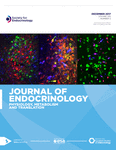- Made available online as an Accepted Preprint 17 March 2011
Type 1 iodothyronine deiodinase in human physiology and disease
Deiodinases: the balance of thyroid hormone
- Endocrine Division, Thyroid Section, Serviço de Endocrinologia, Hospital de Clínicas de Porto Alegre, Universidade Federal do Rio Grande do Sul, Rua Ramiro Barcelos, 2350, CEP 90035-003 Porto Alegre, RS, Brazil
- (Correspondence should be addressed to A L Maia; Email: almaia{at}ufrgs.br)
Abstract
Thyroid hormone is essential for the normal function of virtually all tissues. The iodothyronine deiodinases catalyze the removal of an iodine residue from the pro-hormone thyroxine (T4) molecule, thus producing either the active form triiodothyronine (T3; activation) or inactive metabolites (reverse T3; inactivation). Type I deiodinase (D1) catalyzes both reactions. Over the last years, several studies have attempted to understand the mechanisms of D1 function, underlying its effects on normal thyroid hormone metabolism and pathological processes. Although peripheral D1-generated T3 production contributes to a portion of plasma T3 in euthyroid state, pathologically increased thyroidal D1 activity seems to be the main cause of the elevated T3 concentrations observed in hyperthyroid patients. On the other hand, D1-deficient mouse models show that, in the absence of D1, inactive and lesser iodothyronines are excreted in feces with the loss of associated iodine, demonstrating the scavenging function for D1 that might be particularly important in an iodine deficiency setting. Polymorphisms in the DIO1 gene have been associated with changes in serum thyroid hormone levels, whereas decreased D1 activity has been reported in the nonthyroid illness syndrome and in several human neoplasias. The current review aims at presenting an updated picture of the recent advances made in the biochemical and molecular properties of D1 as well as its role in human physiology.
- Received in final form 15 March 2011
- Accepted 17 March 2011
- © 2011 Society for Endocrinology











